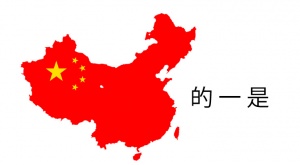Difference between revisions of "Language/Mandarin-chinese/Vocabulary/10-Most-Common-Chinese-Characters"
m (Quick edit) |
|||
| (25 intermediate revisions by 5 users not shown) | |||
| Line 1: | Line 1: | ||
[[File:most-common-chinese-characters.jpg|thumb]] | |||
[[File:Chinese-Language-PolyglotClub.jpg|thumb]] | |||
Welcome to our lesson on the 10 most common Chinese characters! 📚 By learning these essential characters, you'll already feel more confident when walking around the streets in China, as you'll be able to recognize some of the written language. However, keep in mind that to become proficient in reading Chinese, you'll need to study a lot more, as a high school-educated Chinese person is thought to know between 3,500 and 4,000 characters. 😮 | |||
However, you | |||
After mastering these 10 characters, you might want to explore other related lessons to expand your Mandarin Chinese vocabulary. Check out our lessons on [[Language/Mandarin-chinese/Vocabulary/Weather-and-Climate|Weather and Climate]], [[Language/Mandarin-chinese/Vocabulary/Introducing-Each-Other-%28Business-vocabulary%29|Mandarin-chinese Vocabulary - Introducing Each Other (Business)]] and [[Language/Mandarin-chinese/Vocabulary/Feelings-and-Emotions|Mandarin-chinese Vocabulary - Feelings and Emotions]] to continue your language learning journey. 加油 (jiāyóu) - Keep up the good work! | |||
==的== | ==的== | ||
*de : grammatical particle | *de: grammatical particle | ||
*dì : | *dì: goal | ||
*dí | *dí: real | ||
==一== | ==一== | ||
*yī : one | *yī: one | ||
*yí : 一个人 yí gè rén one person | *yí: one (before falling tone) 一个人 yí gè rén = one person | ||
*yì : 一点儿 yìdiǎnr a little | *yì: one (before high, rising, low tones) 一点儿 yìdiǎnr = a little | ||
==是== | ==是== | ||
*shì : to be | *shì: to be | ||
==不== | ==不== | ||
*bù, bú | *bù: not (before high, rising, low tones) | ||
*bú: not (before falling tone) | |||
==了== | ==了== | ||
*verb particle | *verb particle | ||
*liǎo : | *liǎo: finish | ||
==人== | ==人== | ||
*rén : people | *rén: people | ||
==我== | ==我== | ||
*wǒ : I | *wǒ: I, me | ||
==在== | ==在== | ||
*zài : at | *zài: at | ||
==有== | ==有== | ||
*yǒu : have | *yǒu: have | ||
*yòu : again | *yòu: again | ||
==他== | ==他== | ||
*tā : he | *tā: he; someone else, something else | ||
[[Category:Chinese-mandarin/Beginner]] | |||
{{#seo: | |||
|title=What are the 10 most common Chinese characters? | |||
|keywords=mandarin, characters, top 10 | |||
|description=By learning the 10 most known Chinese characters, you will have taken the first step in your learning | |||
|og:image=http://wiki.polyglotclub.com/images/2/29/Most-common-chinese-characters.jpg | |||
}} | |||
==Other Lessons== | |||
* [[Language/Mandarin-chinese/Vocabulary/山-shān|山 shān]] | |||
* [[Language/Mandarin-chinese/Vocabulary/意-yì-meaning,-intention|意 yì meaning, intention]] | |||
* [[Language/Mandarin-chinese/Vocabulary/Express-Surprise|Express Surprise]] | |||
* [[Language/Mandarin-chinese/Vocabulary/孩-hái-child|孩 hái child]] | |||
* [[Language/Mandarin-chinese/Vocabulary/破-pò-break,-tear,-split|破 pò break, tear, split]] | |||
* [[Language/Mandarin-chinese/Vocabulary/Kitchen|Kitchen]] | |||
* [[Language/Mandarin-chinese/Vocabulary/跑-păo-run|跑 păo run]] | |||
* [[Language/Mandarin-chinese/Vocabulary/Gardening|Gardening]] | |||
* [[Language/Mandarin-chinese/Vocabulary/队(隊)-duì-team,-group|队(隊) duì team, group]] | |||
* [[Language/Mandarin-chinese/Vocabulary/米-mĭ-uncooked-rice|米 mĭ uncooked rice]] | |||
<span links></span> | |||
Latest revision as of 21:59, 24 March 2023
Welcome to our lesson on the 10 most common Chinese characters! 📚 By learning these essential characters, you'll already feel more confident when walking around the streets in China, as you'll be able to recognize some of the written language. However, keep in mind that to become proficient in reading Chinese, you'll need to study a lot more, as a high school-educated Chinese person is thought to know between 3,500 and 4,000 characters. 😮
After mastering these 10 characters, you might want to explore other related lessons to expand your Mandarin Chinese vocabulary. Check out our lessons on Weather and Climate, Mandarin-chinese Vocabulary - Introducing Each Other (Business) and Mandarin-chinese Vocabulary - Feelings and Emotions to continue your language learning journey. 加油 (jiāyóu) - Keep up the good work!
的[edit | edit source]
- de: grammatical particle
- dì: goal
- dí: real
一[edit | edit source]
- yī: one
- yí: one (before falling tone) 一个人 yí gè rén = one person
- yì: one (before high, rising, low tones) 一点儿 yìdiǎnr = a little
是[edit | edit source]
- shì: to be
不[edit | edit source]
- bù: not (before high, rising, low tones)
- bú: not (before falling tone)
了[edit | edit source]
- verb particle
- liǎo: finish
人[edit | edit source]
- rén: people
我[edit | edit source]
- wǒ: I, me
在[edit | edit source]
- zài: at
有[edit | edit source]
- yǒu: have
- yòu: again
他[edit | edit source]
- tā: he; someone else, something else
Other Lessons[edit | edit source]
- 山 shān
- 意 yì meaning, intention
- Express Surprise
- 孩 hái child
- 破 pò break, tear, split
- Kitchen
- 跑 păo run
- Gardening
- 队(隊) duì team, group
- 米 mĭ uncooked rice

